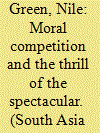| Srl | Item |
| 1 |
ID:
085018


|
|
|
|
|
| Publication |
2008.
|
| Summary/Abstract |
At 10:15 on the night of 31 May 1903, the D-block of the recently completed Sita Ram Building in Bombay suddenly came down with a crash. Most of the building was unoccupied, but on the ground floor was a saloon bar, which over the past months had done a brisk trade with British soldiers and sailors. The customers of this bar comprised most of the dead and injured when the building collapsed.
Since the bar stood across the road from the tomb of a Muslim saint, rumours spread that the disaster was the direct result of the insult to the holy man and implicitly of the transgression of Muslim space by the combined efforts of the Hindu bar-owner and his bibulous patrons. This short essay explores the moral tensions that found expression with the collapse of the Sita Ram Building through a comparison of its reportage in an English-language newspaper and an Urdu hagiography of the offended saint. At the same time, it draws attention to the neglected importance of colonial Bombay as a prime location of the early Muslim experience of globalising modernity
|
|
|
|
|
|
|
|
|
|
|
|
|
|
|
|
| 2 |
ID:
085020


|
|
|
|
|
| Publication |
2008.
|
| Summary/Abstract |
Ideas of 'the refugee' in India, long integrated with concepts of the nation through the partition experience, have significantly contributed to India's lack of formal refugee legislation. The present article argues that the resultant vague conceptual basis-or 'script'-for refugee treatment has allowed India to deal relatively successfully with refugee situations of great variation and huge scale in the past when refugees were largely integrated into an existing narrative of 'minorities', a vital component of India's national identity and political landscape. However, recent pressures from within and from the international community to standardise refugee treatment and introduce a formal refugee law have combined with political events of recent years to disadvantage some refugee groups. This article seeks to understand the changes in refugee treatment in India today and focuses on Tibetans, who appear to suffer increasingly from association with a changing narrative that links refugees, penetration by outsiders, and threats to national security, arising partly as a result of the activities of refugee Tamils from Sri Lanka, and non-refugee incomers from Pakistan.
|
|
|
|
|
|
|
|
|
|
|
|
|
|
|
|
| 3 |
ID:
085022


|
|
|
|
|
| Publication |
2008.
|
| Summary/Abstract |
Examining patterns of mate selection and the core issue of agency, this brief article reports on fieldwork in a remote community in Pakistan, where the family continues to have supervening influence over individual choices in mate selection through exchange marriages. It explores the role of the family as a security provider and demonstrates the limited scope for individual agency. The behaviour of the family in mate selection, where strong security concerns are observed, indicates a culture-centered approach to tackle the issue in a clan context, where members try to maximise various aspects of security in the exchange of mate relations. Intensive fieldwork indicates significant feelings of insecurity among individuals over spouse selection and adoption of family-centered choices. Often the families of this agrarian community give priority to exchange marriages of their offspring, leaving limited options for the evasion of family control, since social security concerns normally prevail. The article also considers briefly the wider implications of such research.
|
|
|
|
|
|
|
|
|
|
|
|
|
|
|
|